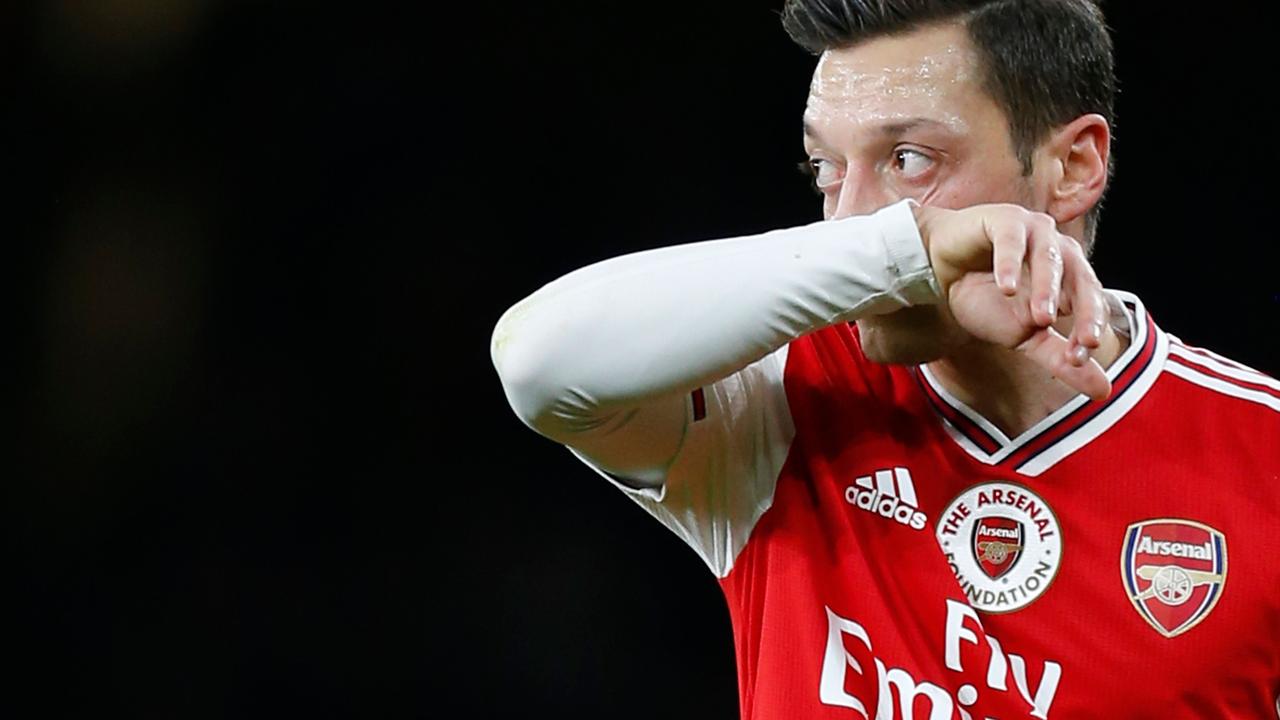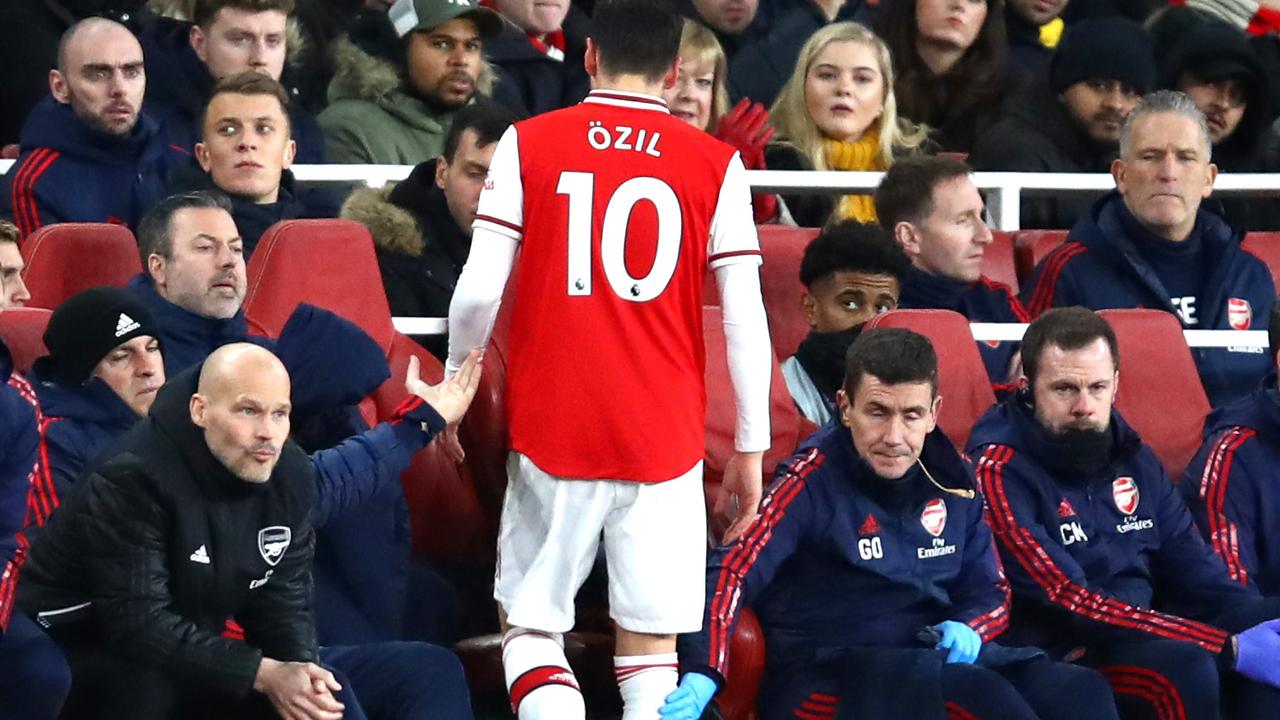China reacts furiously to football star Mesut Ozil’s criticism of its human rights abuses
When Arsenal superstar Mesut Ozil published a blunt post on Instagram, he managed to anger one of the world’s most powerful countries.
China has once again moved to quell criticism of its human rights abuses, cancelling live coverage of a high profile English Premier League match over comments from one of the competition’s star players.
Arsenal midfielder Mesut Ozil published a lengthy post on his social media accounts on Friday, calling out China’s persecution of the Uighur ethnic minority within its borders and accusing his fellow Muslims of looking the other way.
The Uighurs are a Muslim minority group native to Xinjiang, the supposedly autonomous region in China’s northwest.
China has been systematically targeting them, incarcerating as many as two million in facilities it describes as “vocational training centres”. In truth, they are modern day gulags where torture and other human rights abuses are rife.
RELATED: What really happened to China’s missing Uighurs
RELATED: Australia calls out China for horrifying persecution
RELATED: Chilling video shows hundreds of Uighur prisoners

Ozil, who is Muslim, described the Uighurs as “warriors who resist the persecution” and “glorious believers who are fighting alone against those who try to forcibly take them away from Islam”.
“The brothers are forced into camps. Chinese men are settled in their families instead of them. The sisters are forced to marry Chinese men,” he said.
“Despite all this, the Ummah (community) of Prophet Muhammad is silent. Doesn’t say anything. Muslims are not supported. Don’t they know that consenting to persecution is persecution?
“While these events have been on the agenda even in the Western media and states for months and weeks, where are the Muslim countries and their media? Don’t they know that staying neutral when persecution is carried out is despicable? Don’t they know that what our brothers and sisters will remember about these sad days, years later, is not the torture of the tyrants, but the silence of us, their Muslim brothers?”
He referred to Xinjiang as “East Turkestan”, the name predominantly used by activists who want the region to be independent from China.
#HayırlıCumalarDoÄŸuTürkistan ðŸ™ðŸ¼ pic.twitter.com/dJgeK4KSIk
— Mesut Özil (@MesutOzil1088) December 13, 2019
Arsenal has a number of commercial interests in China – it partners with several Chinese businesses, and has recently opened Arsenal-themed restaurants and bars in the country.
More broadly, China is an extraordinarily lucrative market for the Premier League, which sold its 2019-22 broadcast rights there for $US700 million.
With all that in mind, no doubt, Arsenal quickly moved to distance itself from Ozil’s comments in a statement posted on the Chinese social media site Weibo.
“Regarding the comments made by Mesut Ozil on social media, Arsenal must make a clear statement,” the club said.
“The content published is Ozil’s personal opinion. As a football club, Arsenal has always adhered to the principle of not involving itself in politics.”
That attempt to diffuse the situation did not stop the backlash from China – and created an entirely new one from fans who accused Arsenal of kowtowing.
Shame on you @Arsenal for putting profits before the lives of more than a Million people currently in concentration camps. Truly disgusting. Guess that Muslim lives just don't matter to you #EastTurkestan #Uighur#UyghurGenocidehttps://t.co/opDR87w34b
— MPACUK (@MPACUK) December 14, 2019
The Global Times, a mouthpiece of the Communist Party, published an article saying Chinese football fans were “angered and disappointed”.
“(Arsenal’s) statement, which was released only in a Chinese version on Chinese social media, did not appease the anger of Chinese soccer fans who want the club to release the statement on Twitter in English and apologise to Chinese fans,” it wrote.
“Just because (Ozil) is a well-known sportsman, it doesn’t give him the right to comment on issues relating to the national interests, and he needs to explain himself.”
China's State-run CCTV removed @Arsenal's Sunday match against @ManCity from its broadcast schedule, after Arsenal star @MesutOzil1088's false comments on Xinjiang disappointed Chinese fans and football governing authorities. Online broadcaster PPTV may also stop airing the game. pic.twitter.com/Ly1WQtcqGg
— Global Times (@globaltimesnews) December 15, 2019
And overnight, China’s state broadcaster cancelled its plans to air Arsenal’s marquee match against Manchester City, replacing it with a replay of Tottenham Hotspur’s game against Wolverhampton Wanderers.
The Global Times published a follow-up article as well, saying Ozil’s comments had “hurt the feelings of the Chinese people” and claiming “calling Xinjiang ‘Eastern Turkistan’ in China is just like supporting Nazis in Germany”.

The reaction to Ozil’s comments echoes China’s treatment of the NBA back in October.
In that case, China took offence to a tweet by the general manager of the Houston Rockets, Daryl Morey, in which he voiced his support for pro-democracy protesters in Hong Kong.
“Fight for freedom, stand with Hong Kong,” Morey said.
He quickly deleted the tweet, but it made no difference. Chinese companies who were partnered with the NBA suspended their ties to the league, and the state broadcaster scrapped its plans to air pre-season games.
Much like Arsenal, the NBA reacted by folding. It posted a statement in Chinese saying it was “extremely disappointed” in Morey’s “inappropriate remarks”.
RELATED: One tweet sparks $4 billion crisis for NBA
RELATED: Chinese fans divided over NBA backlash
RELATED: Donald Trump and LeBron James’ cowardice
There are plenty more examples in recent times of companies bowing to China’s government to protect their financial interests.
ESPN employees received an internal memo barring them from referencing Chinese politics when talking about the NBA controversy.
Multiple airlines apologised for using “incorrect” maps of China which did not list Taiwan as part of the country.
Mercedes-Benz apologised for posting an Instagram photo with a quote from the Dalai Lama.
Paramount Pictures got rid of the Taiwanese flag on Tom Cruise’s jacket in the trailer for Top Gun: Maverick.
The gaming company Activision Blizzard banned professional player Chung Ng Wai from its tournaments after he voiced support for the Hong Kong demonstrators in a postgame interview.
We could go on.
A couple of months ago, Australia joined 22 other countries to condemn China at the United Nations over its horrifying treatment of the Uighur minority.
“We call on the Chinese government to uphold its national laws and international obligations and commitments to respect human rights, including freedom of religion or belief, in Xinjiang and across China,” Britain’s UN Ambassador Karen Pierce said.
She was speaking on behalf of a group including Australia, the United States, Germany, France, Japan, Canada and New Zealand.
Some of the world’s most powerful countries were on the list. But they were outnumbered.
RELATED: World turns blind eye to China’s persecution of Uighurs
Valentin Rybakov, the UN Ambassador for Belarus, issued a strikingly Orwellian response on behalf of 54 nations, praising China’s “remarkable achievements in the field of human rights”.
“Now safety and security have returned to Xinjiang and fundamental human rights of people of all ethnic groups there are safeguarded,” he said.
China itself dismissed Ms Pierce’s statement as “slander” and accused her of using human rights as an excuse to “interfere in others’ domestic affairs”.




